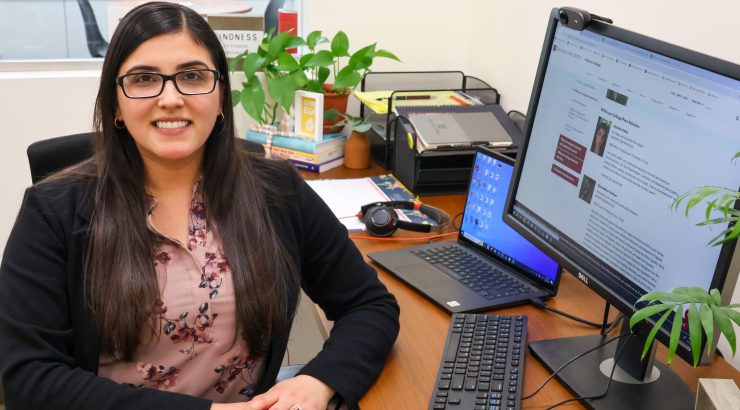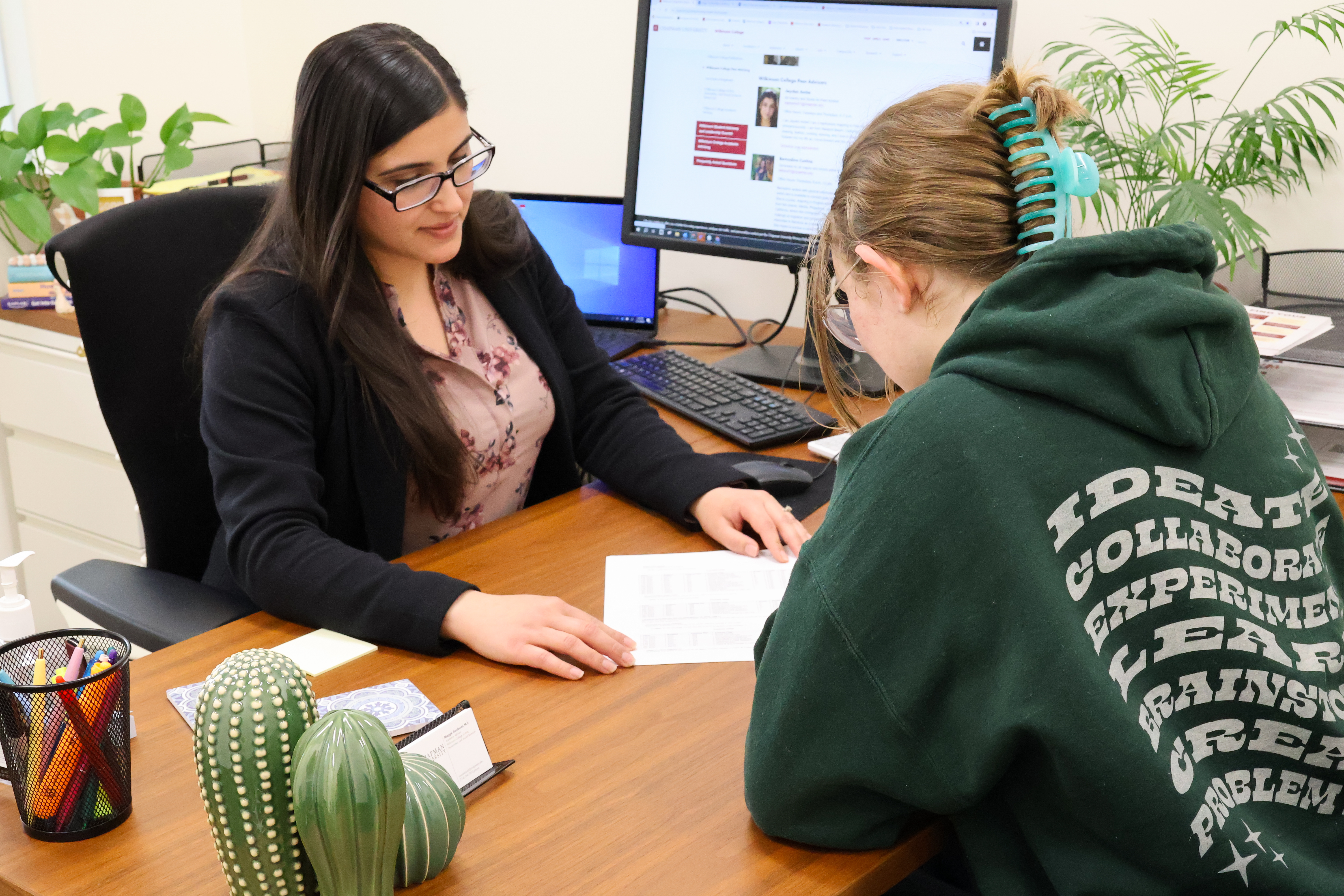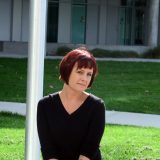
Guidance and Growth: A Conversation with Maggie Sandoval of Wilkinson College
October 30, 2024

Wilkinson College Academic Advisor Maggie Sandoval (left) helps a student with her course load. Photo by Ava Brandt
Did you know that all students in Wilkinson College of Arts, Humanities, and Social Sciences have a dedicated academic advisor?
Maggie Sandoval. is here to help students make informed decisions about their education and achieve their goals in college. She supports all Wilkinson students with program evaluations, graduation reviews, GE and policy questions, guidance regarding declaring a major or minor, general guidance regarding study abroad, academic policies, and probation. She also oversees the Peer Advisor Program with Dr. Charissa Threat, Associate Dean for Student and Faculty Advancement in Wilkinson College.
In addition to Maggie, her assistant Ryhan Warmerdam helps support students with general advising questions and both are available for appointments throughout the year. Schedule an appointment with Maggie or Rhyan today!
The Voice of Wilkinson sat down with Maggie to discuss all things advising.
VoW: What’s your number one goal when meeting with a student?
MS: My number one goal is to support the student’s academic success. This means making sure they understand all their degree requirements, options to completing their degree, and addressing any challenges or questions they have.
VoW: What can a student expect from a meeting with you?
MS: Students can expect to get a comprehensive review of all their degree requirements. I will make sure to address any questions they might have. I will refer students to the appropriate departments for additional guidance.
VoW: What’s the biggest misconception when a student meets with you?
MS: As an Academic Advisor I advise on GEs and overall requirements, but I cannot advise on major or minor requirements. I can provide suggestions based on degree requirements and course offerings but ultimately, we still want students to meet with their faculty advisors to ensure all major requirements are satisfied. I also cannot make any exceptions or changes to a major or minor.
VoW: What is the one thing students don’t realize you can do?
MS: As of spring 2024, advisors can help register students. I cannot bypass any prerequisites or holds. Still, when discussing courses with a student, it’s nice that I can register the student into an open course. We usually ran into issues if students did not have their laptops or if they did bring their laptops, they were scrambling to try to register themselves. Registering students is beneficial, especially when a course has limited seats, and the student doesn’t have to stress about the course being available.
VoW: What are the top three questions students typically ask you?
MS: The top three questions I get are:
- Can I transfer credits from another college? We have a lot of students who want to transfer courses, especially GE courses, like their language requirement. There are limits on how many credits a student can transfer and a specific process to ensure that the course is transferrable. I meet with students one-on-one to guide them through this process, but I hope to offer a workshop in the spring that more students can attend.
- Will I graduate on time? This is tricky because we can look at overall credits, but my top recommendation is to meet with a peer advisor and create an academic plan. This will give you a more accurate expected graduation date.
- Can I create an Academic Plan? Typically, students want to create four-year plans with me. Unfortunately, to be able to accommodate more students, I don’t review academic plans. We have resources for students who want to create academic plans such as the suggested 4-year plans and our wonderful Peer Advisors can also help with that! I usually refer students to our Peer Advisors because they do an amazing job.
VoW: What are the top three ways students should be prepared when meeting with you?
MS: Top three ways to be prepared for a meeting with me:
- Number one is to come with questions. If they have any questions, I recommend you write them down. A lot of times I get students who tell me “I had another question, but I can’t remember.” This will just ensure you have a better advising experience, but I always welcome follow-up questions via email.
- Number two is if you have specific goals let me know about them. If you have clear academic goals, then this can guide the conversation and make it more productive.
- Share any relevant information. If you are transferring courses from another college, thinking about changing your major or dropping a course. All of this helps me better prepare for your appointment.
VoW: What top 3 skills does it take to be an academic advisor?
MS: The top 3 skills I think it takes to be an academic advisor:
- Being a good listener: I want to make sure that I understand the needs of students, their goals, and any concerns they might have. This means allowing students to lead the advising appointment if they have specific questions they need answered.
- Being empathetic: Sometimes it’s hard to remember I was anxious and overwhelmed picking classes when I was in college. Remembering my own experience helps me understand what students might be going through when preparing for advising.
- Attention to detail: I think attention to detail is also important. I review a lot of students’ records and make sure I review overall requirements, and prerequisites, ensuring all academic policies are satisfied is key to ensuring a student graduates.
VoW: We hear students are sometimes confused between what an academic advisor does vs. a counselor. Can you explain the difference?
MS: As an academic advisor, I understand students encounter personal challenges, including mental health concerns and medical/family emergencies. While I would love to support students in all aspects of education, I am not a licensed counselor. If a student mentions they are facing an issue that is not academic, I refer them to the Student Psychological Counseling Service, where trained professionals can provide the assistance a student needs.
VoW: How many students do you see each semester?
MS: My daily appointments vary based on other meetings I may have to attend. Typically, I see about 5-6 students a day, 25 – 30 weekly, and 85 – 90 monthly. Since the beginning of the fall semester, I have seen over 180 students.
VoW: Anything else you want Wilkinson students to know?
MS: We have a Wilkinson College Advising Canvas Den that has a lot of resources for students. I post announcements, like upcoming events and deadlines, and I also have a column in This Week in Wilkinson where I offer tips and reminders each week.

